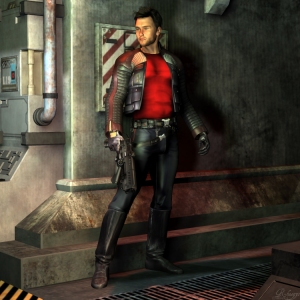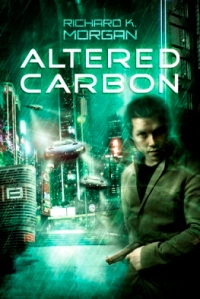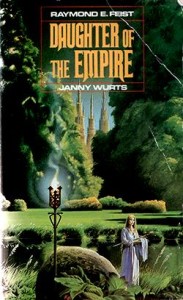Recently (actually about a month ago) Joss Whedon spoke at an Equality Now function. In some circles this was lauded (Jezebel called it perfect), others were less certain (such as The Mary Sue), and many were downright critical. I don’t want to down-play the importance of the feminist discussion, and we should all recognise just how problematic is the depiction of women in genre fiction and genre fandom. (If you don’t, try scrolling through the images here, many of which are drawn from Whedon’s own work).
I am a Whedon fan, but not a full Whedonite. I loved Buffy and Angel. I loved Firefly. Dollhouse, not so much. Serenity was ok. Cabin in the Woods was clever but problematic in many ways, not the least of which was that in its knowing parody of sexist horror tropes it conformed to all of the sexist horror (as explained brilliantly by Kirstyn McDermott). But I digress. With no disrespect to the importance of the feminist discussion, an article by Clem Bastow got me thinking about Orientalism, another aspect of equality that genre fiction needs to confront.
Rebecca Brown’s essay on Orientalism in Firefly/Serenity gives a great outline for what Whedon has done in drawing on Oriental aesthetics and culture, but what he has not done is drawn into stark focus by Mike Le. A future culture in which Western and Oriental language, fashion and philosophy is blended, but no one exists who is of Asian appearance? Le rightly asks if such a gendered world could have been made – a world of male and female cultural equality – without female characters. I suspect not. I am certain, not.
I was reminded of Richard Morgan’s future/noir novels in which Takeshi Kovacs is protagonist. The character is explicitly located as being culturally Japanese/Slavic (and fiercely pedantic of the pronunciation of his name: Koh-vach). For all sorts of reasons related to the technologies available in Takeshi’s world the physical appearance of the character is less relevant than you might assume, but this is the internet’s #1 image of him:
And here he is on a book cover:
That’s some obvious white-washing, and even if we give Kovacs a re-sleeving pass, there’s plenty more examples of Asian characters being white-washed, or erased, or presented in yellow-face. I could go all the way back to Mr. Yunioshi, or David Carradine in ‘Kung Fu’, but unlike black-face, this is not some embarrassing relic of the past. Tom Cruise as the ‘Last Samurai’, Keanu as the main one of ’47 Ronin’, 2010’s all-caucasian ‘Last Airbender’, 2012’s ‘Cloud Atlas’, even ‘Pacific Rim’ cast Clifton Collins Jnr as Tendo Choi.
On his blog over the past months Alan Baxter had guest posts from people discussing their early inspirations in genre fiction. The post by Thoraiya Dyer on the Feist/Wurts ‘Empire trilogy’ struck a cord with me because I too read and greatly enjoyed those books. For me they were one of the first examples – perhaps the first example outside of folk stories and mythoilogies – of Fantasy from a Non-Anglo perspective. Much as with ‘Dune’, which I also read as a teen, I was fascinated by the different culture, the different way of life, that was presented.
Mara of the Acoma is a young woman, powerless by the regular measures of the genre. She is no warrior, no adept of magic, has no divinely assured destiny. She is unprepared fro the challenges she faces but survives and overcomes them by the force of her agency and wits. Here she is on the cover:
Never mind that Mara is obviously described as dark-haired. Never mind that the buildings of her world are more rice-paper screens than towering spires of marble. Never mind that she really has no use for a sword. And yes, the civilising white saviour comes in later to show her how much better things could be if only her culture were whiter and more European, but until that point the books did an excellent job of introducing me, and apparently Thoraiya, and I’m sure many other readers, to new cultural influences on Fantasy. I sure do hate the character of Kevin, but that’s a discussion for another day.
Paul Atreides is the privileged white male, but he only comes into his power when he leaves that world. Re-reading ‘Dune’ recently I was struck by how my younger self had missed the obvious parable: when a technologically superior force invades a desert to extract from it the natural resources required to maintain their technologies, the native inhabitants look to a religious leader to mount a rebellion against their oppressors. Again – Paul is the white saviour, giving the Fremen a leader that couldn’t have come from within, but still, this was the 70s.
Forward to today and I am reading Mazarkis Williams’ first novel, clearly set in an Orientalist culture. I am not far into the novel, so I won’t comment further, but it is still difficult to see this culture as anything but the Other. Perhaps that is for me as a reader to overcome.
My own writing draws on the culture I see in the streets and workplaces where I live, in my friends and the friends of my family, in the public spaces I frequent, but my novel, especially in its earliest drafts, was set in the pseudo-Euro tropes of lazy Fantasy. As a young writer one tends to reproduce what one has read. As Neil Gaiman says, “Most of us only find our own voices after we’ve sounded like a lot of other people.”
I think the question that fascinates me here is when writers can draw upon cultures of the Other to add to their world (as I believe Morgan did with the Kovacs novels), and when does it become white privilege mining other cultures and appropriating elements that then become stereotypes?
I don’t have the answer, but much as with good art – I feel that I know it when I see it.



July 23rd, 2014 at 10:53 pm
[…] Let me say from the outset, I want comics to diversify and tell the stories of people who are not straight, white guys. I want more stories with protagonists of colour. I want my sons to see superheroes that reflect the world they live in, populated as it is by shades of brown, by more women than men, by the rich traditions of cultures from around the globe. I’ve written here about diversity in storytelling before. […]